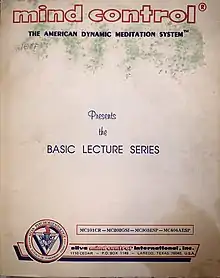Silva Method
The Silva Method is a self-help and meditation program developed by José Silva. It claims to increase an individual's abilities through relaxation, development of higher brain functions, and psychic abilities such as clairvoyance.[1]

It has been variously classified as a self-religion,[2] a new religious movement, and a cult.[3] While there has been reference to the cult concept as it relates to the Silva Method, Powers[3] acknowledges how the Silva Method does not quite fit since the Silva Method benefits from general population appeal and accepts interface with traditional medicine.[3]
Biography
José Silva, an electronics repairman, grew up in Laredo, Texas. He developed an interest in psychology to see if it could help him increase his children's IQ. After experimenting and being convinced of his daughter's sudden clairvoyance, Silva decided to learn more about the development of psychic abilities.[4]
In 1944 Silva began developing his method, formerly known as Silva Mind Control. He used it on his family members and friends before launching it commercially in the 1960s.[1][5]
Silva was the subject of a 1990 biography.[6]
Technique
The technique aims to reach and sustain a state of mental functioning, called alpha state, where brainwave frequency is seven to fourteen Hz.[7]:p19-20 Daydreaming and the transition to sleeping are alpha states.[7]:p19-20
Silva claimed to have developed a program that trained people to enter certain brain states of enhanced awareness. He also claimed to have developed several systematic mental processes to use while in these states allowing a person to mentally project with a specific intent. According to Silva, once the mind is projected, a person can allegedly view distant objects or locations and connect with higher intelligence for guidance. The information received by the projected mind is then said to be perceived as thoughts, images, feelings, smells, taste, and sound by the mind. The information obtained in this manner can be acted upon to solve problems.[7]
Skepticism
James Randi wrote that the Silva Method:[5]
claims to develop improved memory, learning ability, and paranormal powers like telepathy. Much of the course consists of "visiting" absent persons imagined by students and performing diagnoses on them. No tests of the validity of this practice have been done; such tests are discouraged by the teachers of the system.
While this may have been true of James Randi's experience, current instructors of the program encourage experimentation and integration of the techniques learned in the system to make it your own.
References
- Carroll, Robert Todd (2003). "Silva Method". The skeptic's dictionary. Hoboken, NJ: Wiley. ISBN 0471480886. OCLC 55751218.
- Peter Clarke (March 2004). Encyclopedia of New Religious Movements. Routledge. pp. 591–592. ISBN 978-1-134-49970-0.
- Powers, A. M. (1984). Silva mind control international: An anthropological inquiry (Parapsychology, cults, psychic, religion). Wayne State University.
- Swain, P. (2020). The Silva Method. BDJ Team, 7(7), 36-37.
- Randi, James (n.d.) [1995 (print)]. "Silva Mind Control". An Encyclopedia of Claims, Frauds, and Hoaxes of the Occult and Supernatural. Digital adaptation by Gilles-Maurice de Schryver. (Online ed.). James Randi Educational Foundation [St. Martin's Press (print)]. Retrieved 26 January 2022.
A system developed by José Silva (1914- ) that claims to develop improved memory, learning ability, and paranormal powers like telepathy. Much of the course consists of 'visiting' absent persons imagined by students and performing diagnoses on them. No tests of the validity of this practice have been done; such tests are discouraged by the teachers of the system.
- Stone, Robert B. (1990). José Silva: The Man Who Tapped the Secrets of the Human Mind and the Method He Used. H.J. Kramer, Inc. ISBN 0-915811-29-4.
- Silva, José (1977). the Silva Mind Control Method. New York, New York: Pocket Books. ISBN 978-0-671-73989-8.
External links